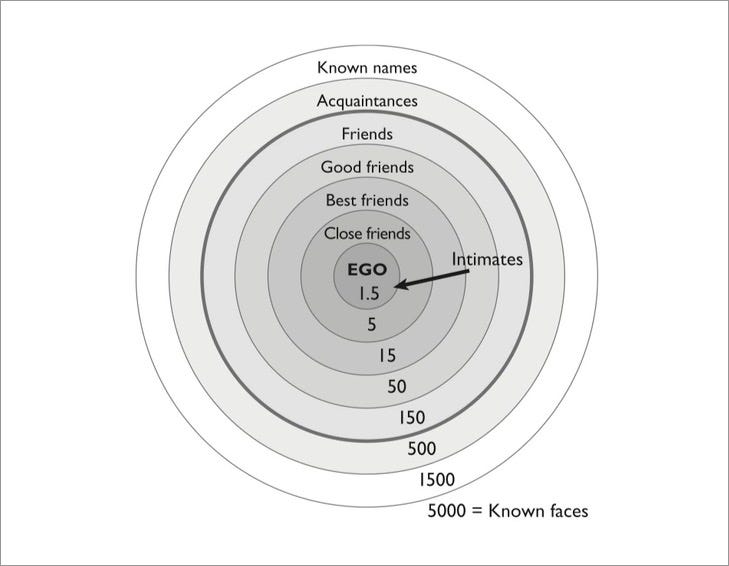You are the center of concentric circles
Dunbar had more than one number and here's what that means
Have a look at this chart for a moment and its concentric circles:

One of these circles contains the concept known as Dunbar’s number. Like the infamous 10,000 hours to mastery rule, 150 is another number that occasionally makes the rounds of blogs, newsletters and social media. Dunbar’s number is a concept that attempts to quantify the maximum number of friends that you or I could have. The diagram above indicates that a person can have 150 friendships.
It says a lot more than that, though.
Dunbar‘s number defined
Dunbar’s number is a concept first described by anthropologist and evolutionary psychologist Robin Dunbar, whose initial research was published in the early 1990s and was recently referenced in his book Friends: Understanding the Power of Our Most Important Relationships.
[Note: I have not had the opportunity to read Friends. My information to date is based upon what I am able to find on the Internet.]
According to Dunbar’s research, the concentric circles in the diagram above represent relationships of different levels of closeness, varying between romantic partners/ closest family members and confidantes all the way to a person’s ability to recognize someone else’s face or name. A key factor (or limitation) of this ability to form relationships is the volume of the neocortex, a part of the brain.
The neocortex, also called the neopallium, isocortex, or the six-layered cortex, is a set of layers of the mammalian cerebral cortex involved in higher-order brain functions such as sensory perception, cognition, generation of motor commands,[1] spatial reasoning and language.[2]
Per Wikipedia - neocortex
Put very simply, the neocortex is a layer of brain tissue that sits on top of the rest of the brain and at a minimum assists or controls a lot of functions that are important for human beings, like our ability to read, think and speak. The neocortex only exists in mammalian brains and generally seems to be most advanced in primates, including human beings.
Dunbar’s research was originally based on non-human primates. The research suggested a correlation between a primate’s neocortex volume and the number of relationships that the primate could maintain. Analysis of study results from different types of primates led to the conclusion that a human being’s neocortex volume should allow it to maintain 148 friendships, which is commonly rounded up to 150.
But wait, there’s more!
There’s a huge caveat to that number, though: per Dunbar there’s a large error measure associated with that value based on the results of his observations. Because of this, a person could maintain between 100 - 250 friendships. For simplicity’s sake we’ll continue to use the 150 value, knowing that it can vary a lot between individuals.
You can tell from the chart at the beginning of this essay that the concentric circles of relationships vary in size by factors of roughly 3x. The actual numbers will vary between individuals, if we follow the same logic used to calculate the original value of 150.
According to this model, I could:
have 1.5 intimate relationships (maybe the .5 is a pet? All kidding aside, I’m assuming this is a calculated value, which suggests the unfortunate possibility that some people have 0 intimates in their lives while other people will have multiple)
have 5 close friends (perhaps closest friends?)
have 15 best friends (I always thought best friends were better than close friends?)
have 50 good friends
have 150 friends (Dunbar once described this group as the people you would be fully comfortable to sit down and have a drink with if you encountered them by chance in a bar)
be acquainted with 500 people (does this include neutral and unfriendly acquaintances? I think it must.)
recognize 1500 names
recognize 5000 faces
Given that the underlying assumptions of this model are subject to some pretty wide calculated ranges I’m not going to question the numbers themselves. I find the groupings interesting, though, and I want to talk a bit about the implications in terms of some things that I find interesting:
memory and cognitive ability
personality types
geography and ability to travel
social media (all media, in fact)
networking
Memory and cognitive ability
In simple terms people have both short term and long term memory. The short term stuff is what’s in your head at the moment, the long term stuff is what you can recall from previous encounters that you can pull into your short term memory, sometimes with some effort.
As an example, I’m thinking about Dunbar’s number and this essay that I’m writing at the moment and this information is sitting in my short term memory at the moment, but with a tiny bit of effort I can remember the last names of my elementary school teachers, none of whom I’ve seen or thought of in years (some of them are probably deceased, actually). Those teacher’s names were sitting in my long term memory until I brought them forward just now. They would best be described as my acquaintances according to Dunbar’s theory since we would have seen each other daily for months at a time and interacted, with me as their student. Interestingly, though, most students would have to fall into the recognized names or faces category, considering that most teachers will interact with hundreds if not thousands of children and parents during decades of teaching. Something to think about there.
Many people will have limits on the number of people they can remember and form some kind of bond with. I do believe that the limitations are largely physical: a person’s brain can only do so much although there are techniques to help compensate for these limitations (there’s a multi billion dollar industry for customer relationship management applications on the high end and people have depended on name and address books for years on the other end - note that I am compelled to mention some kind of notebook at least once per month in this newsletter!).

I think there are some interesting parallels here. How many phone numbers and email addresses can you remember off the top of your head, as an example? During my first couple of years of my professional life, I came to memorize well over 100 names and phone numbers at work because I was dealing with a large number of people and because 4 digit phone extension numbers aren’t so hard to remember if you use them enough. Not sure that I could do that today, over 30 years later!
A couple of other notes:
I am amazed that a person could remember 5,000 faces!
And remembering 1,500 names is pretty impressive, too.
Personality types
Then there’s personality types to consider. Regardless of what you may think about personality quizzes or tests like the Myers Briggs Type Indicator, there is a known continuum of personality traits ranging from extraversion to introversion. Introverts like me usually find it challenging to stay engaged within groups of people because it drains our energy. Other people, who we’d consider to be extraverts, thrive being around other people: being around other people gives the extravert energy and makes them happier.

I’d argue that introverts will often have fewer people in their concentric circles, at least in the days prior to the Internet and social media. Other than being in physical contact with people the only other way to interact with them would have been by telephone or mail. And relationships take work, so the introverts might only focus on best and close friends and effectively treat most other people as acquaintances.
Geography and ability to travel
If you lived in a small community and never left it then the composition of your friendship circles would be quite different than someone who lived in a city and naturally had more opportunities to interact with a larger group of people.
What this suggests to me, though, is that the innermost circles of friendships might not change much with geography but the outermost circles certainly could.
Other
As for the implications of Internet and social media and networking on our ability to form different kinds of relationships… stay tuned for my next post, coming soon!
Further reading: an interview with Robin Dunbar
Over to you: here’s a few questions for you to ponder:
Have you heard of Dunbar’s number before?
Do you think people are limited in the number of friendships that can have?
Do you think the different circles posited by Dunbar make sense?
Do you think that introverts will always have fewer friends and relationships than extraverts?




![Friends: Understanding the Power of our Most Important Relationships by [Robin Dunbar] Friends: Understanding the Power of our Most Important Relationships by [Robin Dunbar]](https://substackcdn.com/image/fetch/w_1456,c_limit,f_auto,q_auto:good,fl_progressive:steep/https%3A%2F%2Fsubstack-post-media.s3.amazonaws.com%2Fpublic%2Fimages%2F36a51ee4-77ee-40c2-b0a3-5eb91d740e17_317x500.jpeg)

Fascinating stuff. I wonder if different cognitive capacities kick in with various contexts. For example, I consider myself generally an introvert and have a hard time remembering names. But in my professional capacity, I switch into extrovert mode and can remember the names of my students. The brain is a mysterious organ.
An absolutely fascinating post, Mark - thank you!
I'm an introvert, and maintaining relationships with friends has always felt very difficult. I envy my extrovert friends for their sociability, but at the same time I imagine that they must be constantly exhausted!
I'd never heard of Dunbar's number, and I wonder if I've ever even MET 500 people? 🤣 Okay, well I have, but I'm sure I don't know anything LIKE the numbers shown on his concentric circles.
I wonder if extroverts have the benefit of equal measures of quantity and quality in their relationships with people?